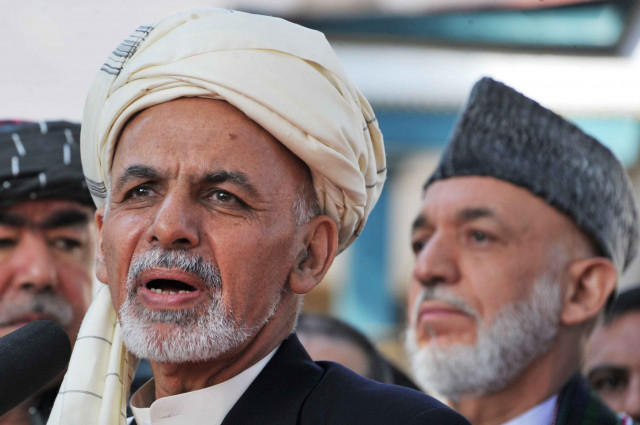The rings of power in Afghanistan
It is now almost a year since elections that brought Ghani to a fragile & fractious power, and Karzai is back in Kabul

There are unverified but credible reports from within the diplomatic community that Mr Karzai is picking away at the weaknesses of the Ghani government. PHOTO: AFP

Anybody who thought they had seen the last of Hamid Karzai when his long period in office ended has failed to understand how the rings of power work. It is now almost a year since the elections that brought Ashraf Ghani to a fragile and fractious power, and Mr Karzai is back in Kabul and back in business — not that he was ever out of business in the first place. Having spent some time out of the country, parts of it in India, he is back on home turf and still carrying considerable political clout, much of it derived from years of generous patronage.
Mr Karzai holds unofficial court in offices at his home, close to the presidential palace where he receives a steady stream of visitors ranging from tribal elders to cabinet ministers of the Ghani government — playing both ends against the middle — and a range of foreign ambassadors and dignitaries who are doing likewise. Gone is the loose-lipped irritant that drove foreign diplomats to teeth-gnashing frustration, to be replaced by a father-of-the-nation figure and the man who, like no other, is the man who can unify the country.
What has not shifted is the Karzai perception that Pakistan is the fly in the national ointment, and that the rapprochement underway in both Kabul and Islamabad is the diplomatic equivalent of hara-kiri, and that Afghanistan is in danger of becoming subservient to Pakistan. This is a narrative that plays well to those allied to him, and he enjoys considerable support — sufficient, were he so minded, to perhaps threaten the government of Ashraf Ghani.
President Ghani, whose elevation was a tortuous process that in the end boiled down to classic Afghan fudge, is on shaky ground. His promise to revitalise the economy has lost momentum, appointments to key government positions remain unmade, mostly bogged down in the treacherous sands of tribal and family considerations and rivalries, and the moves to improve ties with Pakistan are not universally popular either within his government or in the wider population. There are unverified but credible reports from within the diplomatic community that Mr Karzai is picking away at the weaknesses of the Ghani government. If these turn out to be successful and the government in Kabul falls, there will be a very large space that is Karzai-shaped into which he could duly slip.
Mr Karzai had more than a decade of power to create and cement a political machine that transcends democratic process and institutionalises traditional structures, creating a parallel and occasionally intersecting the world that is a blend of old and even older. President Ghani is not going to give up easily, though he has none of the clout of Karzai nor the brand-loyalty and recognition. The rings of power pass from hand to hand in Afghanistan, generally with the finger they are on having to be severed first. If President Ghani prospers, and we sincerely hope he does, then so much the better, but it will be against the run of play and Mr Karzai has a stacked deck.
Published in The Express Tribune, July 21st, 2015.
Like Opinion & Editorial on Facebook, follow @ETOpEd on Twitter to receive all updates on all our daily pieces.















COMMENTS
Comments are moderated and generally will be posted if they are on-topic and not abusive.
For more information, please see our Comments FAQ